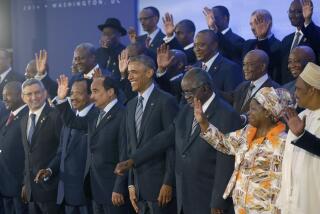Free Market, Not Aid, Africa’s Hope, Shultz Says
- Share via
DAKAR, Senegal — Secretary of State George P. Shultz, arriving here early today at the start of a six-nation tour of Africa, said hard-pressed African economies can do themselves more good by emphasizing private enterprise than by waiting for U.S. foreign aid.
Talking to reporters shortly before his Air Force jetliner landed at Dakar, Shultz said some past programs damaged the recipient nations because donated food and other commodities discouraged local production.
“One reason why, over a 20-year period, per capita food production (in Africa) declined was that generosity drove production out of business,” Shultz said.
‘Excited’ About Trip
The secretary, making his first trip to sub-Saharan Africa, said he is “quite excited” about the trip because many African nations, including all six he will visit, “see that a state-dominated economy which many have tried . . . simply doesn’t work very well.”
For several years, the U.S. government has given preference in aid programs to African nations adopting free-market economies. The Reagan Administration intends to continue that emphasis, but because of sharp budget restrictions, there is not much aid money for African nations regardless of their economic system.
Africa accounts for only about 5% of the $14.5-billion foreign aid request in the budget President Reagan submitted this week. Most of the money was earmarked for Israel, Egypt and nations that permit the establishment of U.S. military bases on their territory.
Trade Dispute Discussed
Before leaving for Africa on Wednesday afternoon, Shultz met in Bermuda with British Foreign Secretary Geoffrey Howe, who discussed with him a festering trade dispute between the United States and the European Communities, of which Britain is a member.
Shultz said he and Howe agreed that “this ought to get settled and not result in retaliation and counter-retaliation.”
Nevertheless, Shultz said, “We don’t feel we have a lot of flexibility” on the issue.
The dispute involves up to $1 billion a year in U.S. corn and other feed grain exports to Spain. Spain, which joined the Common Market on Jan. 1, 1986, is required to impose Common Market agricultural tariffs, which U.S. officials say will sharply reduce U.S. sales.
Reagan late last week ordered retaliatory tariffs imposed on a variety of European products, including British gin and French wine and cheese, if the dispute is not settled by Feb. 1.
“Nobody wants to have a trade war break out,” Shultz said, “but there are clear damages, and there must be compensation.”
British sources said Howe argued that the United States has substantial industrial markets in Spain and should give some ground on the agricultural dispute. Howe added, however, that if the new U.S. tariffs take effect, the Europeans will retaliate against additional American products.
After his stop in Senegal, Shultz goes on to Cameroon, Kenya, Nigeria, Ivory Coast and Liberia. He will return to Washington on Jan. 15.
More to Read
Sign up for Essential California
The most important California stories and recommendations in your inbox every morning.
You may occasionally receive promotional content from the Los Angeles Times.










